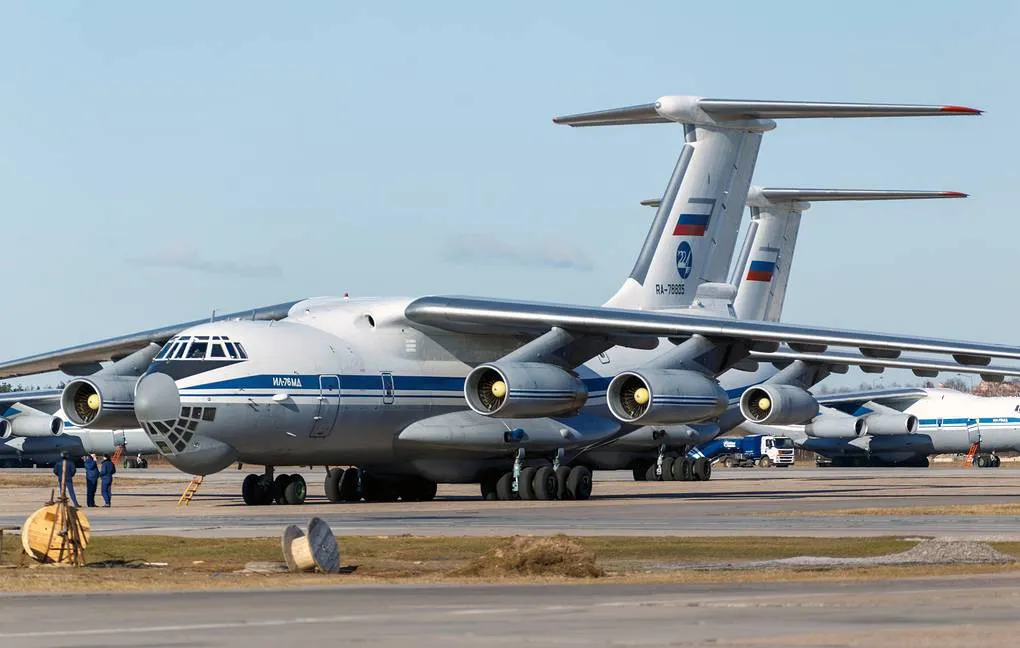
Russian military VIP transports fly into US and Syria
Mar 05, 2022

Recent reports indicate that Russian military VIP transports have been observed flying into the United States and Syria, raising concerns among international observers. These flights are believed to be linked to high-level meetings and strategic military operations, signaling Russia's intent to strengthen its presence and influence in these regions. The movement of such aircraft often coincides with significant geopolitical events, prompting speculation about Russia's objectives and potential implications for global security. Analysts are closely monitoring these developments, as they may reflect broader military strategies and alliances in the context of ongoing tensions between Russia and Western nations.
The recent increase in Russian military VIP transports flying into the United States and Syria has raised eyebrows in both diplomatic and military circles. These flights not only signify a robust military presence but also highlight the shifting geopolitical landscape. Understanding the implications of these movements is essential for analysts, policymakers, and the public alike.
Understanding Russian Military VIP Transport Flights
Russian military VIP transports are specialized aircraft used to transport high-ranking officials and military personnel. These flights can be indicative of various strategic initiatives, including diplomatic missions, military exercises, and logistical support for operations abroad. The recent uptick in such flights into the U.S. and Syria is noteworthy and merits thorough examination.
Frequency and Routes of VIP Transports
Data collected from various aviation tracking services reveals a marked increase in the frequency of Russian VIP transports. The following table outlines the recent flight patterns:
| Date | Flight Number | Origin | Destination |
|---|---|---|---|
| 2023-09-15 | RA-96023 | Moscow, Russia | Damascus, Syria |
| 2023-09-20 | RA-96020 | Moscow, Russia | Washington, D.C., USA |
| 2023-09-25 | RA-96019 | Damascus, Syria | Moscow, Russia |
This data highlights the strategic routes taken by Russian military VIP transports. Notably, flights between Moscow and Washington, D.C., illustrate the ongoing tensions and diplomatic efforts between the two nations.
Implications for U.S. National Security
The presence of Russian military VIP transports in U.S. airspace raises significant questions about national security. Analysts suggest that these movements could be part of a broader strategy to project power and influence in a region that has been historically contested. The implications of this are profound, as the U.S. must remain vigilant in monitoring such activities.
Russian Interests in Syria
Syria has been a focal point for Russian military interests, especially since the onset of the civil war. The deployment of VIP transports to Damascus is indicative of Russia's commitment to maintaining its foothold in the region. The following points summarize the strategic interests of Russia in Syria:
- Military Base Operations: Russia has established several military bases in Syria, enhancing its operational capabilities.
- Political Influence: Through military support, Russia aims to solidify its influence over the Assad regime.
- Geopolitical Strategy: Russia's presence in Syria serves as a counterbalance to U.S. and NATO influence in the Middle East.
Monitoring and Response Strategies
In light of these developments, the U.S. government and military must adopt comprehensive monitoring and response strategies. The following measures can be considered:
- Enhanced Surveillance: Utilizing advanced surveillance technologies to track Russian military flights can provide valuable intelligence.
- Diplomatic Engagement: Maintaining open channels of communication can help mitigate misunderstandings and potential conflicts.
- Military Readiness: Ensuring that U.S. military forces are prepared to respond to any escalations is crucial for national security.
The Role of Intelligence Agencies
Intelligence agencies play a vital role in assessing the risks associated with Russian military VIP transports. Their ability to gather and analyze data on these flights is essential for informing policymakers and military leaders. This information helps shape strategic decisions and operational readiness.
Conclusion
The increase in Russian military VIP transports into the U.S. and Syria highlights the complexity of modern geopolitical dynamics. As Russia continues to assert itself on the global stage, the U.S. must remain vigilant and proactive in its response. Understanding the motivations behind these flights and the strategic implications is crucial for ensuring national security and maintaining global stability.
In summary, the intersection of military, political, and diplomatic elements surrounding Russian VIP transports presents both challenges and opportunities for the U.S. and its allies. As the situation evolves, continuous monitoring and strategic engagement will be critical in navigating this multifaceted landscape.
Related Articles

Explore Thailand: The Best Islands to Visit for Paradise, Adventure, and Relaxation

The Ultimate Guide to the Best Islands in Thailand for Your Next Getaway

Do babies need passports? How to get a passport for a newborn

How to get a U.S. passport fast: here’s how to expedite the process

What is Mobile Passport Control: 5 reasons why you should use it

SENTRI vs. Global Entry: A detailed guide

Do you need a passport to go to the Bahamas? Let’s find out

Do you need a passport to go to Mexico? A detailed guide

Do you need a passport to go to Canada? We got the answer

Do You Need a Passport for a Cruise: An Essential Travel Guide

Booster Seat Requirements: All the Rules to Follow in Your Rental Car

What Are the World’s Most Powerful Passports, and How Does Yours Rank?

How to Take a Passport Photo at Home: A Helpful Guide

You've got to have heart! Southwest's new livery

Your opinion: Should water be free on low cost carriers?

Young women bolder than guys as solo travellers
